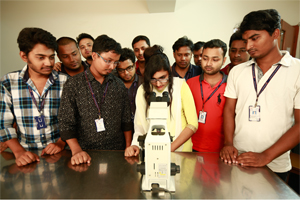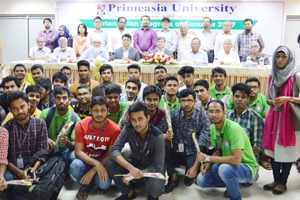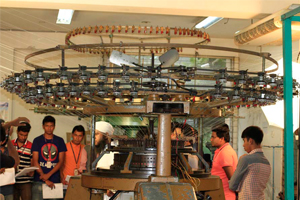
Realizing the acute shortfall of Engineering and technological education in both private and public sector universities, a group of philanthropist created Primeasia Foundation and came forward to establish non-profit making and non-sectarian private university named Primeasia University to provide quality education in Science, Engineering and Technology. The Primeasia University got Government and UGC approval on August 26, 2003 and launched its educational program from October 01, 2003.
Through the process of learning problem solving and critical thinking is emphasized focusing on the application of theoretical knowledge to the investigation and resolution of challenges at the human- environment interface. This is accomplished in an active, hands-on, learning environment grounded in a curriculum focused on community design and environmental sustainability. Competition is deemphasized in favor of collaboration and each individual's success is celebrated as an achievement of the community.
The Textile Engineering program cultivates invention, creativity, and skill through hands on exploration that is the foundation of technology. Also, the knowledge of cultural diversity, communication, history, criticism is inseparable from the application of technology. This process is followed to make “Textile Engineers.
The Textile Engineering Department started operating with 37 students in enrollment in Textile Engineering Department to provide students with opportunities, exposure, expertise and resources to meet the growing demands of qualified engineers in the Textile and RMG sector.
Since then the Textile Engineering Department of Primeasia University is providing 4-year undergraduate program having 176 credits in B.Sc. Textile Engineering with specialization in a) Yarn Manufacturing Technology, b) Fabric Manufacturing Technology c) Wet Processing Technology and d) Garments Manufacturing Technology. Our education program is a semester system having three semesters per year of 12 semesters cov

ering theoretical courses, practical sessions, project works and programmed industrial training in different textile mills, such as Spinning Mills, Weaving Factories, Wet Processing Mills and RMG factories.
Our education program is designed in such a way that the students are taught socio-cultural sciences, fundamental sciences, basic textile subjects, exposed to basic textile processing machinery to high tech textile processing machinery, modern aspects of accounting, management and marketing.
The first year of our students are exposed to the textile profession, scientific basis of science and engineering. The students are taught English, physics, chemistry, mathematics, statistics, computer applications, engineering drawing, workshop practices, engineering materials, textile materials, history, tradition and culture of textile industries of the region.
In the second year the students are exposed to textile machineries and processes on spinning, weaving, knitting, wet processing and garments manufacturing and subjects such as electrical control system, polymer, basic textile physics, computer programming, sociology and culture.
The third year students are given in-depth exposure and knowledge on the modern textile processes, such as advanced textile physics, product design, product manufacturing, product testing and quality control, machine design, micro processor, control engineering etc to make the students knowledgeable and exposed to textile processing machinery and their repair and maintenance and replacement, production planning and research projects are also carried under the guidance of experienced faculty members of the Textile Engineering Department of the university.
The final year students are mostly carry advanced studies of the subject of specialization on either Yarn Manufacturing Engineering, or Fabric Manufacturing Engineering, or Wet Processing Engineering, or Apparel Manufacturing Engineering, Industrial Management, Accounting, Maintenance and Management of te

xtile machinery, Application of Computer in Textiles etc. Then the students has to go through an floor level industrial training for at least 6(six) weeks) in the production and on-job training in the textile industries.
So far 3200 students have obtained B.Sc. degree in Textile Engineering and all of them are gainfully employed in different sectors of textile industries, banks, buying houses, teaching, and some are pursuing higher postgraduate studies in the country and abroad. At present we have 828 students enrolled for pursuing B.Sc. degree in Textile Engineering.
Textile Engineering Department has 4(four) Professors, 3(three) Associate Professors, 1(One) Assistant Professor, 10 (Ten) Sr. Lecturers and 12 (Twelve) Lecturers, numbering 30(Thirty) as full time of which 4(Four) are Ph.D. degree holder. The faculty members have first class higher academic degrees from home and abroad with wide industrial and teaching background. There are also 23(twenty three) adjunct faculty members for the department.
The Textile Engineering Department has the following state-of-the-art laboratory: Physics, Chemistry, Computer, Engineering Drawing, Mechanical Engineering & Workshop Practice, Textile Testing & Quality Control, Weaving, Knitting, Spinning, Fabric Structure & Analysis, Wet Processing, Apparel (with Pattern & Design with CAD & Plotter, Cutting & Sewing with CAM) & IPE.
In the central library there are rich collection of textile related books and journals which is constantly being replenished.
Textile Engineering Department of PAU has the proud privilege of signing a MOU with Bangladesh Jute Mills Corporation (BJMC) and Bangladesh Jute Spinners Association (BJSA) wherein students of Textile Engineering Department will be given Industrial Training on the floor level production processes in their mills. This will open-up job opportunities to our graduates in the jute sector and at the same time will meet the acute shortage of qualified Textile Engineers for the jute industries.r>
 Realizing the acute shortfall of Engineering and technological education in both private and public sector universities, a group of philanthropist created Primeasia Foundation and came forward to establish non-profit making and non-sectarian private university named Primeasia University to provide quality education in Science, Engineering and Technology. The Primeasia University got Government and UGC approval on August 26, 2003 and launched its educational program from October 01, 2003.
Through the process of learning problem solving and critical thinking is emphasized focusing on the application of theoretical knowledge to the investigation and resolution of challenges at the human- environment interface. This is accomplished in an active, hands-on, learning environment grounded in a curriculum focused on community design and environmental sustainability. Competition is deemphasized in favor of collaboration and each individual's success is celebrated as an achievement of the community.
The Textile Engineering program cultivates invention, creativity, and skill through hands on exploration that is the foundation of technology. Also, the knowledge of cultural diversity, communication, history, criticism is inseparable from the application of technology. This process is followed to make “Textile Engineers.
The Textile Engineering Department started operating with 37 students in enrollment in Textile Engineering Department to provide students with opportunities, exposure, expertise and resources to meet the growing demands of qualified engineers in the Textile and RMG sector.
Since then the Textile Engineering Department of Primeasia University is providing 4-year undergraduate program having 176 credits in B.Sc. Textile Engineering with specialization in a) Yarn Manufacturing Technology, b) Fabric Manufacturing Technology c) Wet Processing Technology and d) Garments Manufacturing Technology. Our education program is a semester system having three semesters per year of 12 semesters cov
Realizing the acute shortfall of Engineering and technological education in both private and public sector universities, a group of philanthropist created Primeasia Foundation and came forward to establish non-profit making and non-sectarian private university named Primeasia University to provide quality education in Science, Engineering and Technology. The Primeasia University got Government and UGC approval on August 26, 2003 and launched its educational program from October 01, 2003.
Through the process of learning problem solving and critical thinking is emphasized focusing on the application of theoretical knowledge to the investigation and resolution of challenges at the human- environment interface. This is accomplished in an active, hands-on, learning environment grounded in a curriculum focused on community design and environmental sustainability. Competition is deemphasized in favor of collaboration and each individual's success is celebrated as an achievement of the community.
The Textile Engineering program cultivates invention, creativity, and skill through hands on exploration that is the foundation of technology. Also, the knowledge of cultural diversity, communication, history, criticism is inseparable from the application of technology. This process is followed to make “Textile Engineers.
The Textile Engineering Department started operating with 37 students in enrollment in Textile Engineering Department to provide students with opportunities, exposure, expertise and resources to meet the growing demands of qualified engineers in the Textile and RMG sector.
Since then the Textile Engineering Department of Primeasia University is providing 4-year undergraduate program having 176 credits in B.Sc. Textile Engineering with specialization in a) Yarn Manufacturing Technology, b) Fabric Manufacturing Technology c) Wet Processing Technology and d) Garments Manufacturing Technology. Our education program is a semester system having three semesters per year of 12 semesters cov ering theoretical courses, practical sessions, project works and programmed industrial training in different textile mills, such as Spinning Mills, Weaving Factories, Wet Processing Mills and RMG factories.
Our education program is designed in such a way that the students are taught socio-cultural sciences, fundamental sciences, basic textile subjects, exposed to basic textile processing machinery to high tech textile processing machinery, modern aspects of accounting, management and marketing.
The first year of our students are exposed to the textile profession, scientific basis of science and engineering. The students are taught English, physics, chemistry, mathematics, statistics, computer applications, engineering drawing, workshop practices, engineering materials, textile materials, history, tradition and culture of textile industries of the region.
In the second year the students are exposed to textile machineries and processes on spinning, weaving, knitting, wet processing and garments manufacturing and subjects such as electrical control system, polymer, basic textile physics, computer programming, sociology and culture.
The third year students are given in-depth exposure and knowledge on the modern textile processes, such as advanced textile physics, product design, product manufacturing, product testing and quality control, machine design, micro processor, control engineering etc to make the students knowledgeable and exposed to textile processing machinery and their repair and maintenance and replacement, production planning and research projects are also carried under the guidance of experienced faculty members of the Textile Engineering Department of the university.
The final year students are mostly carry advanced studies of the subject of specialization on either Yarn Manufacturing Engineering, or Fabric Manufacturing Engineering, or Wet Processing Engineering, or Apparel Manufacturing Engineering, Industrial Management, Accounting, Maintenance and Management of te
ering theoretical courses, practical sessions, project works and programmed industrial training in different textile mills, such as Spinning Mills, Weaving Factories, Wet Processing Mills and RMG factories.
Our education program is designed in such a way that the students are taught socio-cultural sciences, fundamental sciences, basic textile subjects, exposed to basic textile processing machinery to high tech textile processing machinery, modern aspects of accounting, management and marketing.
The first year of our students are exposed to the textile profession, scientific basis of science and engineering. The students are taught English, physics, chemistry, mathematics, statistics, computer applications, engineering drawing, workshop practices, engineering materials, textile materials, history, tradition and culture of textile industries of the region.
In the second year the students are exposed to textile machineries and processes on spinning, weaving, knitting, wet processing and garments manufacturing and subjects such as electrical control system, polymer, basic textile physics, computer programming, sociology and culture.
The third year students are given in-depth exposure and knowledge on the modern textile processes, such as advanced textile physics, product design, product manufacturing, product testing and quality control, machine design, micro processor, control engineering etc to make the students knowledgeable and exposed to textile processing machinery and their repair and maintenance and replacement, production planning and research projects are also carried under the guidance of experienced faculty members of the Textile Engineering Department of the university.
The final year students are mostly carry advanced studies of the subject of specialization on either Yarn Manufacturing Engineering, or Fabric Manufacturing Engineering, or Wet Processing Engineering, or Apparel Manufacturing Engineering, Industrial Management, Accounting, Maintenance and Management of te xtile machinery, Application of Computer in Textiles etc. Then the students has to go through an floor level industrial training for at least 6(six) weeks) in the production and on-job training in the textile industries.
So far 3200 students have obtained B.Sc. degree in Textile Engineering and all of them are gainfully employed in different sectors of textile industries, banks, buying houses, teaching, and some are pursuing higher postgraduate studies in the country and abroad. At present we have 828 students enrolled for pursuing B.Sc. degree in Textile Engineering.
Textile Engineering Department has 4(four) Professors, 3(three) Associate Professors, 1(One) Assistant Professor, 10 (Ten) Sr. Lecturers and 12 (Twelve) Lecturers, numbering 30(Thirty) as full time of which 4(Four) are Ph.D. degree holder. The faculty members have first class higher academic degrees from home and abroad with wide industrial and teaching background. There are also 23(twenty three) adjunct faculty members for the department.
The Textile Engineering Department has the following state-of-the-art laboratory: Physics, Chemistry, Computer, Engineering Drawing, Mechanical Engineering & Workshop Practice, Textile Testing & Quality Control, Weaving, Knitting, Spinning, Fabric Structure & Analysis, Wet Processing, Apparel (with Pattern & Design with CAD & Plotter, Cutting & Sewing with CAM) & IPE.
In the central library there are rich collection of textile related books and journals which is constantly being replenished.
Textile Engineering Department of PAU has the proud privilege of signing a MOU with Bangladesh Jute Mills Corporation (BJMC) and Bangladesh Jute Spinners Association (BJSA) wherein students of Textile Engineering Department will be given Industrial Training on the floor level production processes in their mills. This will open-up job opportunities to our graduates in the jute sector and at the same time will meet the acute shortage of qualified Textile Engineers for the jute industries.r>
xtile machinery, Application of Computer in Textiles etc. Then the students has to go through an floor level industrial training for at least 6(six) weeks) in the production and on-job training in the textile industries.
So far 3200 students have obtained B.Sc. degree in Textile Engineering and all of them are gainfully employed in different sectors of textile industries, banks, buying houses, teaching, and some are pursuing higher postgraduate studies in the country and abroad. At present we have 828 students enrolled for pursuing B.Sc. degree in Textile Engineering.
Textile Engineering Department has 4(four) Professors, 3(three) Associate Professors, 1(One) Assistant Professor, 10 (Ten) Sr. Lecturers and 12 (Twelve) Lecturers, numbering 30(Thirty) as full time of which 4(Four) are Ph.D. degree holder. The faculty members have first class higher academic degrees from home and abroad with wide industrial and teaching background. There are also 23(twenty three) adjunct faculty members for the department.
The Textile Engineering Department has the following state-of-the-art laboratory: Physics, Chemistry, Computer, Engineering Drawing, Mechanical Engineering & Workshop Practice, Textile Testing & Quality Control, Weaving, Knitting, Spinning, Fabric Structure & Analysis, Wet Processing, Apparel (with Pattern & Design with CAD & Plotter, Cutting & Sewing with CAM) & IPE.
In the central library there are rich collection of textile related books and journals which is constantly being replenished.
Textile Engineering Department of PAU has the proud privilege of signing a MOU with Bangladesh Jute Mills Corporation (BJMC) and Bangladesh Jute Spinners Association (BJSA) wherein students of Textile Engineering Department will be given Industrial Training on the floor level production processes in their mills. This will open-up job opportunities to our graduates in the jute sector and at the same time will meet the acute shortage of qualified Textile Engineers for the jute industries.r>
